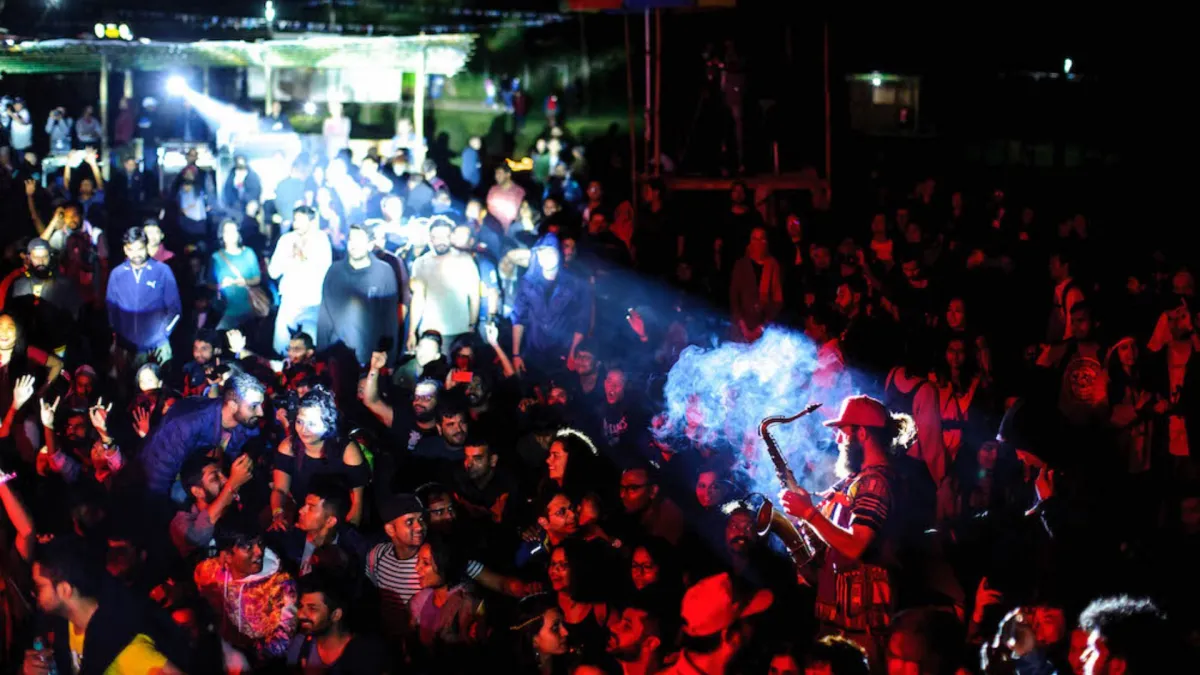Bobby Hano: It all began with a casual conversation about the festival with Anup Kutty and continued as we spearheaded it till the end. Reflecting on the first year brings back a flood of vivid memories. It was a truly transformative experience, filled with excitement, challenges, and remarkable moments that have left an indelible mark on me. One of the strongest memories from the first year is the overwhelming sense of community and unity that emerged throughout the festival. It was a testament to the power of music and the ability of an event like the Ziro Festival to bring people together. The response we received from both the artists and the audience in the first year remains special. Seeing the artists pour their hearts into their performances and witnessing the joy and appreciation on the faces of the attendees affirmed that we had created something truly special. The positive energy and enthusiasm were contagious, and it fueled our determination to make the Ziro Festival a platform for artistic expression and cultural exchange.
In terms of changing anything that happened in the first year, I believe that hindsight often brings the desire for improvement. While there were certainly challenges and areas where we faced unexpected obstacles, they were crucial for our growth and learning. The first year allowed us to understand the nuances of organizing such a large-scale event, and we continuously adapted and improved as we went along.
The tribe I belong to, the Apatani, has been practising forest protection since time immemorial. The preservation of the ecosystem has always been an integral part of our traditions. Every year, after completing our renowned Myoko festival, the community visits our own forest to honour our ancestral spirits, whom we believe protect us. Therefore, the ecological aspects were already ingrained in our minds when we initiated this festival.
While it is indeed difficult to pick favourites among the numerous talented artists who have graced our festival, there are a few that I consider significant coups in terms of their presence at Ziro. Though I’d like to mention a Pakistani band (Natasha Humera Ejaz), who unfortunately couldn’t come due to visa issues in 2016. I was really looking forward to watching them perform live at our festival, but their visa was denied, and they couldn’t make it to India. Additionally, even if they had entered India, it wouldn’t have been not easy for them to visit Arunachal Pradesh. Pakistani, Chinese, Afghan, and Bangladeshi citizens are required to obtain clearance from the Ministry of Home Affairs in order to enter the region.
The night before the first edition of the festival began, we were certain we wouldn’t even make it through the weekend! But we did. And now we are on our 10th edition (12 years if you count the pandemic). It’s like watching a baby grow up and go to college. When we started this journey, we had a vision of creating a unique platform that celebrates music, art, and culture in a breathtaking natural setting. However, I must admit that there were times when we did not anticipate the tremendous success and longevity that the Festival has achieved. Over the past ten years, Ziro Festival has grown from a humble beginning into a prominent cultural event that brings together artists, musicians, and enthusiasts from around the world. The journey has been both exhilarating and challenging. Seeing the festival evolve and leave a lasting impact on the creative landscape has been truly fulfilling. Our initial aspirations were focused on creating a space where artists could showcase their talents, where diverse communities could converge, and where music lovers could immerse themselves in a transformative experience. We strived to foster a sense of belonging, cultural exchange, and artistic exploration. Through the unwavering support of our team, volunteers, artists, sponsors, and the local community, Ziro Festival has persevered and thrived. It is a testament to the shared passion and dedication that went into making this dream a reality. The festival has not only endured but has grown stronger with each passing year, transcending expectations and carving a unique identity for itself.
Sustainability and waste management is always a challenge. It’s easy to come up with ideas but it’s extremely challenging to get everyone to implement these changes and practise them. We try to gamify waste management through ballot bins and incentivise the segregation of waste. It also helps that we work closely with local groups like the Apatani Women’s Association to help execute these ideas. On the other hand, we have been working with the local government systems for the disposal of non-compostable waste.
International presence at the festival has grown over the years because Ziro is a unique festival and the attendees are very receptive to new acts. It’s a great place for a band to gather new fans. Typically about 10-20% of our lineup is international and we are grateful for the continued support from cultural agencies like the British Council, Embassy of Israel and Institut de Francais. I believe that the fusion of Indian and international artists creates a unique and captivating experience for our festival-goers. By bringing together artists from different cultures and backgrounds, we aim to create a harmonious blend of musical styles and genres, allowing the audience to explore new perspectives.


